Blog
Toolblox 2.0 — The most powerful platform for creating custom smart-contracts with no-code
 Mon, 13 Jan 2025 22:10:02 GMT by Silver / Toolblox
Mon, 13 Jan 2025 22:10:02 GMT by Silver / ToolbloxToolblox 2.0 — The most powerful platform for creating custom smart-contracts with no-code
Today we are proud to announce a significant update to Toolblox which contains version 2 of the Contract Maker. More capability, better user-experience, still no coding!
New features in a nutshell:
- Reorderable multi-level visual coding
- New structural code blocks: For-each, try-catch, if
- New property types: list, maps, custom types, hash
- Global methods
- Oracle integration
- New flat visuals and other UI tweaks (paging, etc)
- Advanced AI support
Reorderable multi-level visual coding
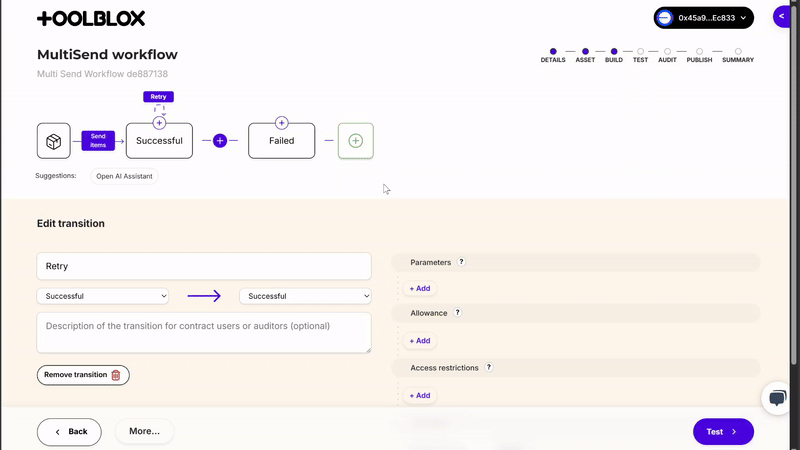
It is now possible to add any number of elements and nested code blocks. The goal is to be able to make it possible to cater to more complex use-cases and be able to digitalize any business process as a smart-contract.
New structural code blocks
These are a couple of the new building blocks that unlock key capabilities.
For-each block
For multi-senders, multi-swaps or advanced validation — it is still sometimes necessary to conduct loops over arrays. Even if it is not that gas efficient and comes with additional risks (check out the try-catch block).
When defining the for-each block, you can specify one or multiple lists to loop over. The generated smart-contract automatically adds validation to check that the lists are of the same size. List items are available as properties inside the for-each loop.
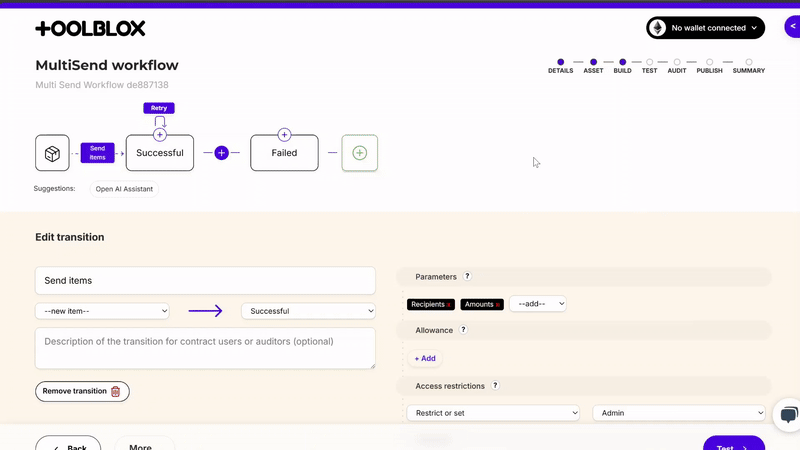
Try-catch block
Try catch block is a special-purpose block that allows you to add defenses against issues arising from calling external contracts. This includes payments. If you think there might be issues when paying an unknown wallet address or executing methods of a volatile smart-contract, the try-catch block can offer ways to deal with this situation.
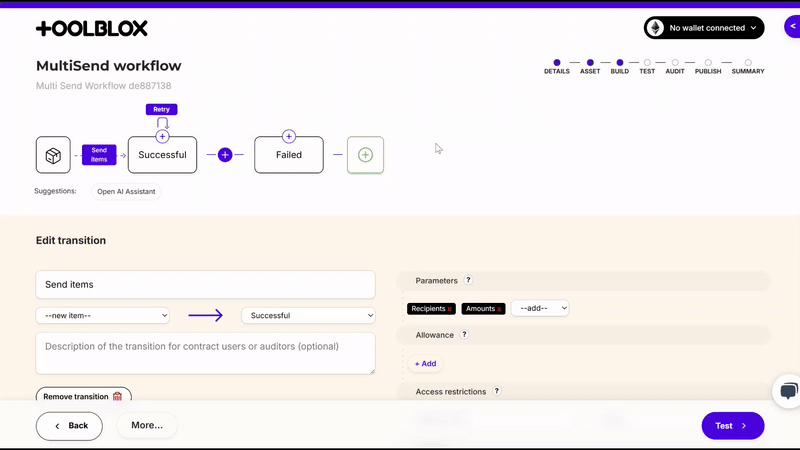
The if block
The humble if. While it was possible to add conditions to blocks and use inline assignments (value = something > threshold ? value1 : value2), it is now possible to construct elaborate if-else scenarios with no-code.
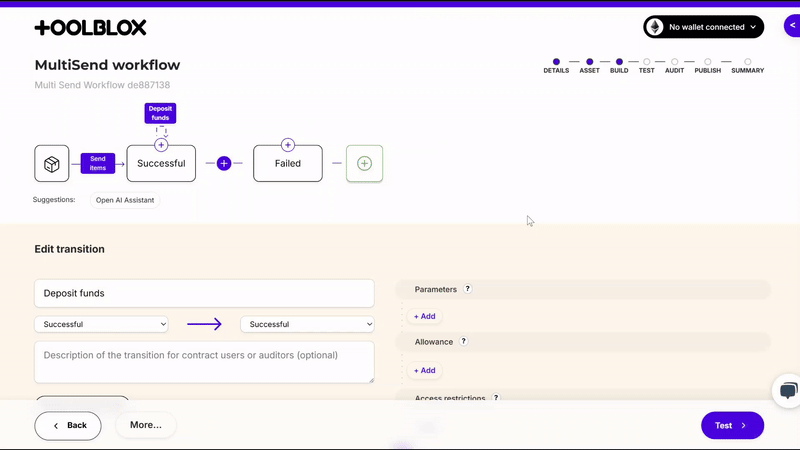
New property types
List

A list property type (datatype) enables to inject smart contract multiple values of the same type. List properties can be used as part of for-each loop. There are also some handy functions that can be used as part of property calculations such as List.Count(list):

Map

Mapping property type is like a key-value pair. For example, mapping with key type Address and value type Integer can be used to define fractional ownership of an entity. As with List property type, there are handy methods to work with Map type:

Custom types
Sometimes simple types are not enough and that’s where the new custom type features come into play. It lets you define container object with multiple properties. This container object can be used to encapsulate method parameters for example.
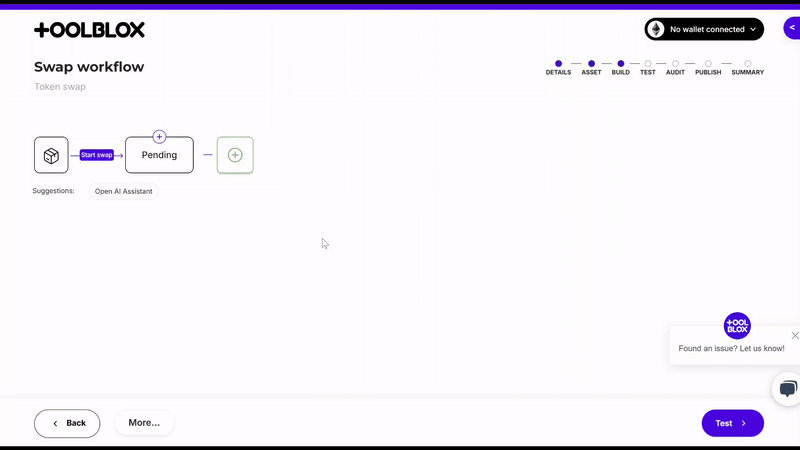
Hash
The hash datatype (bytes32 in Solidity) and the complementary function ‘Utils.Hash( item1, item2, … )’ are useful in advanced validation scenarios.
Global methods
It is now possible to leave both from and to states as empty in a transition to create general methods that can only work with transient or global properties. This feature lets you create advanced scenarios to change global properties or multiple global properties at once.
Oracles support
Already announced last year, it is now possible to create an oracle data type and access its values.
To define an oracle create a property of type Oracle. Then choose the oracle provider (Quex, Chainlink or 1Inch) choose the property from where to get the asset to query or alternatively hardcode the asset name into the fallback:

Advanced AI support
All of this goodness is available to the Toolblox AI as well. So go to ChatGPT — ToolBlox to use our GPT or just use the built-in AI assistant directly to get things done.
Summary
2025 will be an important year for Toolblox and we are proud to leap into it with a much more powerful and capable engine. There are some great new integration scenarios just around the corner. Whether you are a freelancer, no-code agency or you just have a great blockchain service idea — we are happy to help you out.
All business settlements will be conducted on-chain in the not-so-distant future so the time to act is now. Let’s launch your blockchain MVP in record time with no-code!
Go to www.toolblox.net to learn more or start building now at app.toolblox.net. You can also reach us at ToolBlox (@tool_blox) / X
Happy new year, fam 🥳!
Toolblox™ offers the flexibility traditionally found in custom development combined with the ease of no-code platforms.
Smart-contract templates, while seemingly convenient, often don't cater to all asset classes or jurisdictions, can stifle business process innovation, and become costly when adapting to specific needs due to re-audit requirements. Custom smart-contract development, on the other hand, is a lengthy and expensive process, requiring specialized skills, and the auditing phase is both costly and time-consuming.
Our smart contracts provide tailored solutions for specific assets, jurisdictions, or business nuances, all while being cost-effective to audit and easy to understand through visual workflows. This ensures you get a precise solution without the associated overheads or limitations.
Tokenization transforms traditional business protocols into self-executing smart contracts, streamlining operations and ensuring clarity.
- Efficiency in Operations: Self-executing contracts automate processes, speeding up operations like reconciliation, administration and settlement.
- Reduced Miscommunication: With every term and condition explicitly coded, there's less room for misunderstandings or disputes.
- Clarity in Business Protocols: Tokenized assets come with predefined rules and protocols, making business operations clearer and reducing ambiguities.
- Liquidity: Assets, even traditionally illiquid ones like art or real estate, become easily tradable, enhancing their accessibility.
- Fractional Ownership: Tokenization divides assets into smaller units, allowing more investors to partake in high-value asset ownership.
- Transparency: Every transaction is transparently recorded on the blockchain, ensuring verifiability by all stakeholders.
- Security: Blockchain's robustness safeguards tokenized assets, minimizing fraud risks.
- Global Market Access: Tokenized assets on Toolblox™ can be traded internationally, expanding market reach and opportunities.
- Supply Chain: Tokenize individual products for transparent tracking from manufacturing to sale.
- ESG Reporting: Ensure verifiable and trusted environmental, social, and governance data points.
- Financial Settlement: Streamline the trade and settlement of financial securities.
- Certified Credentials: Authenticate jewelry certificates, diplomas, and other achievements.
- NFT Marketplaces: Facilitate the creation, listing, and sale of unique digital art.
- DAO Governance: Automate company by-laws and decision-making within decentralized organizations.
- Asset Monetization: Tokenize real estate, land, or data sets for easy trading and verification.
- Ticketing Systems: Secure event ticket sales, verification, and anti-fraud measures.
- Insurance Operations: Simplify the insurance claim process, from filing to settlement.
- Document Timestamping: Verify the existence and integrity of documents with a secure timestamp.
- One-Time Smart Contracts: Create custom contracts for specific buy/sell/service agreements.
- Business Model Innovation: Develop new token-based business models for diverse industries.
- Smart Contract Auditing: Tokenize the auditing process, ensuring transparency and accountability in smart contract reviews.
- Proof of Physical Work Contracts: Manage contractor tasks, milestones, and handovers with tokenized contracts that verify completed work.
- Consultation Services: Tokenize consultation hours or packages, allowing clients to purchase and redeem services seamlessly.
- Subscription Services: Implement token-based subscriptions for content, software, or other services, ensuring automated renewals and access control.
Think of Toolblox™ as a hammer. We help you build your digital house (the smart-contract), but once it's built, the house stands on its own.
While we provide an auto-generated user interface and offer hosting solutions, the ownership and operation of the smart-contract and its data are entirely yours. This ensures seamless integration with any external system and guarantees robustness and adaptability for the future.
Integrating smart-contract workflows is straightforward with Toolblox™. While there are standard methods like using JavaScript web3 libraries, we offer a user-friendly DApp builder that allows you to embed smart contract actions directly into your solution.
Additionally, for those who prefer no-code platforms, we provide an open API and plugins, including compatibility with popular platforms like Bubble. This ensures a seamless integration tailored to your business needs.
Absolutely. Toolblox™ is primarily designed for no-code solution developers who understand business needs, are familiar with no-code tools, and aim to craft an MVP for a web3 solution.
However, we also cater to business owners and analysts with a feature that employs AI to generate visual workflows. This can then be handed over to technical teams for further refinement.
For those with a technical background, we offer advanced features like source code extraction and GitHub export, ensuring a comprehensive experience for teams of all sizes.
Cross-workflow calling is baked into the builder. This means that any workflow can call any other workflow.
No, we use AI to generate the workflow of an asset or service. We then compose the smart-contract out of standardised components without using any AI generation. This process (for which we have filed a patent for) offers predictability and dependability while allowing you to use AI generation to kick-off the development process. It also makes the smart-contract easier and more cost-effective to audit.

